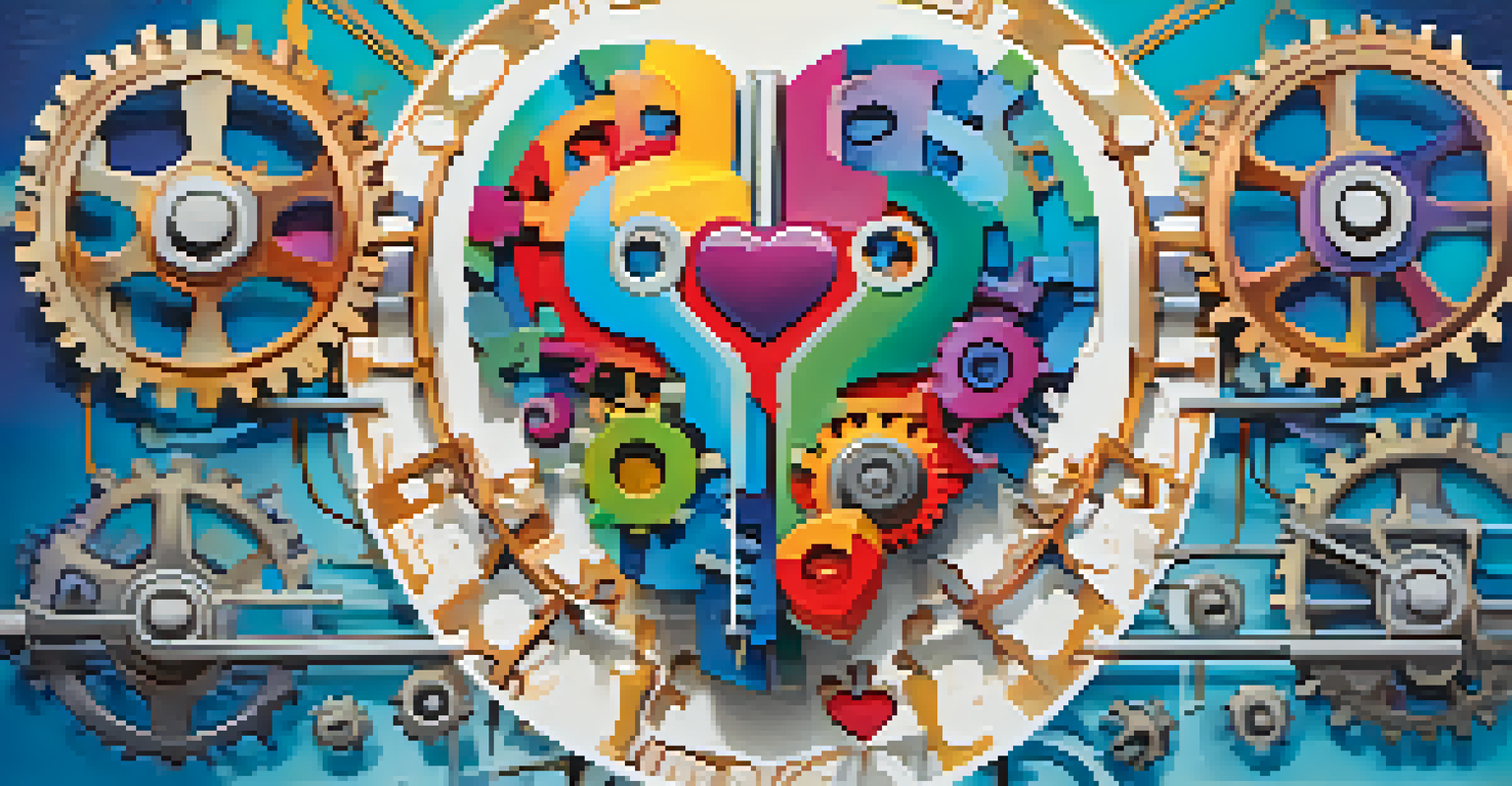Emotional Intelligence in Conflict Resolution at Work

Understanding Emotional Intelligence in the Workplace
Emotional intelligence (EI) refers to the ability to recognize, understand, and manage our own emotions and the emotions of others. In the workplace, this skill plays a crucial role in fostering collaboration and harmony among team members. When individuals possess a high level of emotional intelligence, they are better equipped to navigate interpersonal challenges and conflicts.
Emotional intelligence is not about being nice. It's about being real. It's about understanding your emotions and the emotions of others, and using that understanding to navigate relationships effectively.
For instance, consider a scenario where two colleagues disagree on a project approach. An emotionally intelligent individual can recognize their own frustration and also empathize with their colleague's perspective. This understanding allows them to address the conflict constructively rather than letting emotions escalate the situation.
By leveraging emotional intelligence, employees can create a more supportive work environment. This not only enhances relationships but also leads to improved productivity and job satisfaction, making EI a vital trait in any organization.
The Role of Self-Awareness in Conflict Resolution
Self-awareness is a key component of emotional intelligence, allowing individuals to recognize their feelings and how these emotions influence their behavior. In conflict situations, being aware of one's emotional triggers can prevent knee-jerk reactions that might exacerbate the issue. For example, if an employee knows they tend to become defensive when receiving criticism, they can prepare themselves to respond calmly.

Additionally, self-awareness encourages individuals to reflect on their thoughts and actions. This reflection can lead to more thoughtful responses during disagreements, fostering a culture of understanding rather than hostility. When team members practice self-awareness, they set a positive example for others, paving the way for healthier interactions.
Emotional Intelligence Enhances Teams
Emotional intelligence fosters collaboration and understanding among team members, improving workplace relationships.
Ultimately, self-awareness not only aids in personal growth but also enhances team dynamics. By understanding their own emotions, employees can contribute to a more empathetic workplace, where conflicts are approached with a mindset of resolution.
Empathy: The Heart of Conflict Resolution
Empathy, or the ability to understand and share the feelings of others, is essential in conflict resolution. When team members can empathize with each other's viewpoints, they are more likely to engage in open and constructive conversations. This connection can transform a potentially hostile situation into an opportunity for collaboration.
The greatest ability in business is to get along with others and to influence their actions.
For example, if a manager listens empathetically to a team member's concerns about workload, they can better address the issue and find a solution together. This not only resolves the immediate conflict but also builds trust and respect within the team. When employees feel heard and understood, they are more likely to contribute positively to the workplace culture.
In practice, fostering empathy involves active listening and validation of feelings. By prioritizing empathy, organizations can cultivate a culture that values emotional connections, making it easier to navigate and resolve conflicts effectively.
Effective Communication: A Tool for Conflict Resolution
Clear and effective communication is critical in resolving conflicts at work. When emotions run high, misunderstandings can easily arise, leading to further disagreements. By communicating openly and honestly, employees can express their thoughts and feelings without escalating the conflict.
For instance, using 'I' statements such as 'I feel overwhelmed when deadlines are tight' instead of blaming others can promote a more constructive dialogue. This approach encourages the other party to listen and respond thoughtfully, rather than becoming defensive. Effective communication is about expressing oneself while also being receptive to others' perspectives.
Self-Awareness Aids Conflict Resolution
Being self-aware helps employees recognize their emotional triggers, allowing for more thoughtful responses during conflicts.
Moreover, regular team communication fosters a sense of belonging and ensures that issues are addressed before they escalate into larger conflicts. By prioritizing open lines of communication, organizations can create a more harmonious work environment.
Managing Emotions During Conflicts
Managing emotions during conflicts is essential for effective resolution. It's natural to feel upset or frustrated, but allowing these emotions to dictate responses can lead to negative outcomes. Instead, individuals can practice techniques such as deep breathing or taking a moment to collect their thoughts before responding.
For example, if a disagreement arises in a meeting, taking a brief pause to gather one's thoughts can prevent impulsive reactions. This moment of reflection can help individuals approach the conflict with a clearer mind and a more constructive attitude. By managing emotions, employees can maintain professionalism and contribute to a more positive resolution process.
Incorporating emotional management strategies into daily routines can be beneficial. By regularly practicing these techniques, employees can enhance their emotional resilience, making it easier to navigate conflicts when they arise.
Collaboration as a Conflict Resolution Strategy
Collaboration is a powerful strategy for resolving conflicts in the workplace. Instead of viewing disagreements as obstacles, employees can approach them as opportunities for collective problem-solving. This mindset shift encourages team members to work together to find solutions that benefit everyone involved.
For instance, when a project team faces differing opinions on the next steps, collaborating to brainstorm ideas can lead to innovative solutions. By valuing input from all members, the team can create a sense of ownership over the outcome, reducing resentment and fostering unity. Collaboration not only resolves the immediate conflict but also strengthens team bonds.
Collaboration Transforms Disagreements
Approaching conflicts as opportunities for collaboration can lead to innovative solutions and strengthened team bonds.
Moreover, encouraging a collaborative approach helps establish a culture of teamwork and respect. When employees see conflicts as chances to collaborate, they become more engaged and invested in their work, leading to improved morale and satisfaction.
Building Emotional Intelligence in the Workplace
Building emotional intelligence in the workplace is a proactive step towards preventing and resolving conflicts. Organizations can offer training programs that focus on developing EI skills, such as self-awareness, empathy, and effective communication. These initiatives empower employees to enhance their interpersonal skills, leading to a more harmonious environment.
Additionally, fostering a culture that values emotional intelligence starts from the top. Leaders who model EI behaviors, such as active listening and empathy, set the tone for the entire organization. When employees see these values in action, they are more likely to adopt them in their own interactions.

Investing in emotional intelligence not only helps in conflict resolution but also contributes to overall employee well-being. By prioritizing EI, organizations can create a positive work culture that promotes collaboration, understanding, and growth.